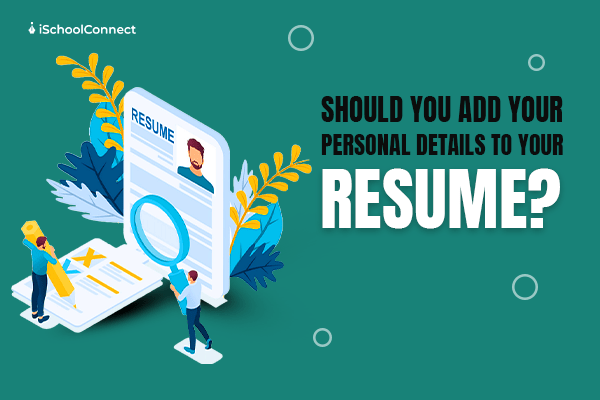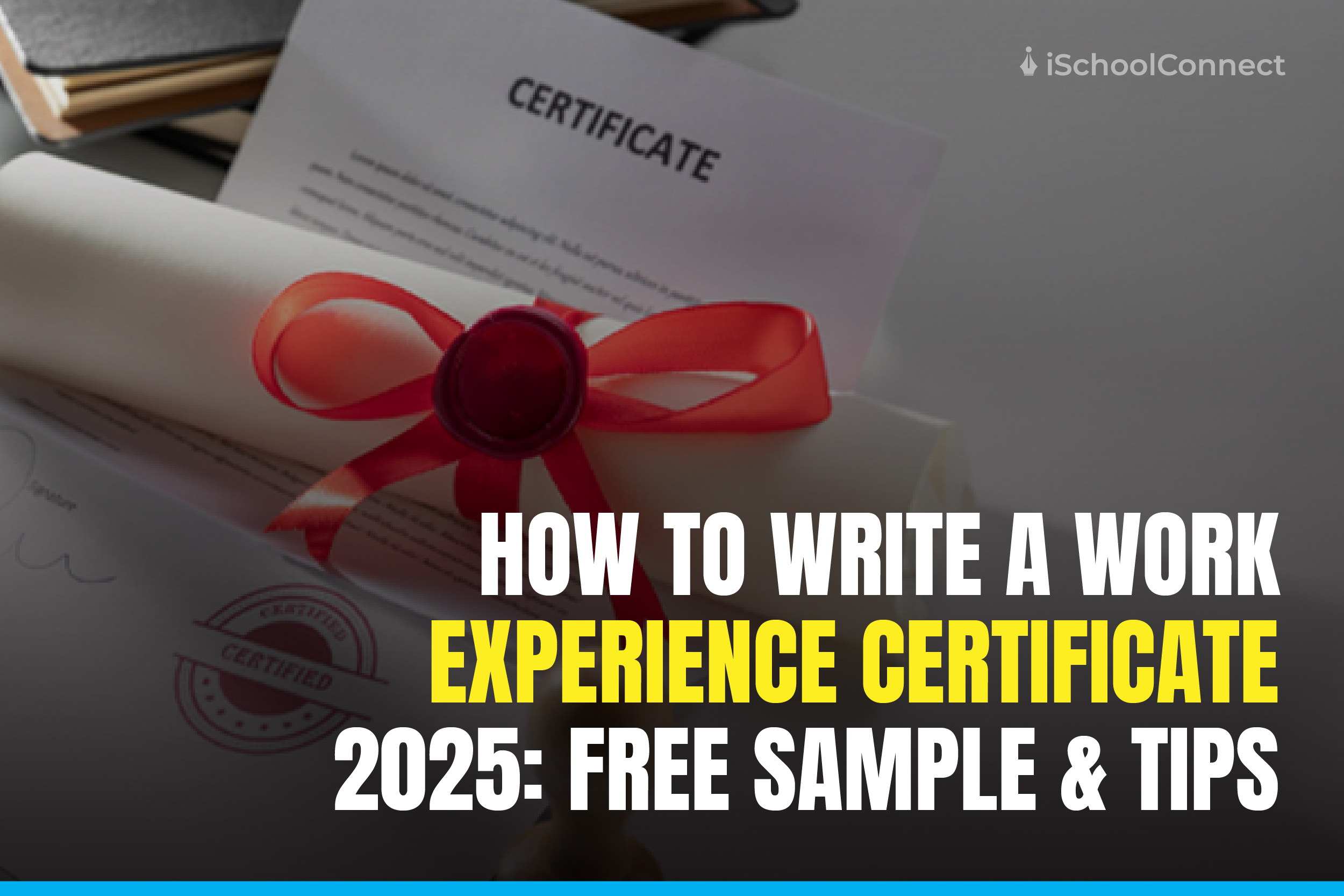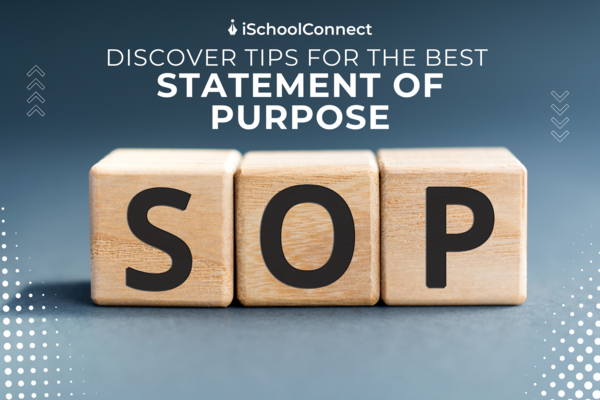Table of Contents
Personal details in a resume | A comprehensive guide
A potential employer’s initial impression of you is based on your resume, or CV (curriculum vitae). Personal details in a resume carry a lot of advantages. If you want to create a good first impression and land this job, your resume should be interesting and contain only positive and relevant information about yourself.
When writing a CV, you may find yourself wondering, ‘Do I need to include personal information on my resume?’ You do, but you must still filter what you put there.
We want you to get your ideal job as much as you do, so we’ve put together some helpful advice on the personal details of your resume.
Personal details in a resume: What to include

Everyone wishes for their resume to stand out and impress a prospective employer. However, not everyone knows how to write a CV correctly, especially if this is their first job and they have never written one of these before.
Make careful to just share the essential personal information; you don’t want your resume to look like a dating profile. It should portray the applicant as a knowledgeable and experienced industry expert.
So, here are some examples of personal details in a resume that would be quite helpful to include and would play an important part in your job search.
Name
The most crucial item to remember is your name when drafting a CV because an employer wants to know how to address you. As a result, put your name on the top page in larger letters than everything else to emphasize its importance.
Make the name prominent and center it to guarantee that it is the first thing a recruiter sees. Some people have lengthy names with many surnames and middle names.
If this is the case, it’s better to write your first and last names, plus a middle name for good measure, rather than your entire name. A resume may be an effective marketing tool as well.
Address
Another important detail to put in your resume is your current address. Including your address offers several advantages, since it shows that you are trustworthy to an employer.
People who are permanently established somewhere and are not constantly moving about will be a fantastic find for an employer because no one wants to work with someone who has a high probability of moving away in a few months. Additionally, if you reside close to the job, it may be an advantage in your application.
Phone number
If a recruiter wants to interview you in the near future, they will need to contact you. This implies that including your phone number on your CV is critical. The person in charge of recruiting you will want to speak with you briefly, hear your voice, and learn about your employment expectations.
When you write your phone number on your CV, you should always double-check that you wrote it accurately. Additionally, if you have specified periods when it is best not to contact you and times when you may receive calls, you should include that information in your resume.
You must provide one more piece of personal information in your résumé to boost your chances of getting approved. When it comes to e-mail addresses, there are some rules to follow. To begin, instead of using your work email, you should use your personal email address.
Aside from that, your username should always be professional, containing your entire name, maybe a number that may indicate your birth date, but no unusual numerals, characters, or amusing online nicknames. Avoid using email addresses like “supersmileycooldude@gmail.com” or “pkspkspks93238@yahoo.com.”
Additional details
Believe it or not, recruiters may request access to your social media accounts to verify your image. You can link your Facebook page if you’re going to supply other connections.
Before applying for a job at a respected firm, you should make sure there are no objectionable photographs or posts online. For example, you should get rid of those images of you and your pals from your previous trip when you got a touch tipsy.
LinkedIn Profile
Though, It is not mandatory to include a LinkedIn profile on your resume, an increasing number of people are doing so to improve their prospects.
This website is really useful for building a solid portfolio, where you can provide some more information about your expertise and talents to back yourself up in case something goes wrong.
Beneficial personal details that are relevant to the job
If your employment requires you to drive, provide a valid driver’s license. However, unless your profession necessitates it, avoid bringing up topics that are unrelated to the task at hand merely to make yourself appear better.
For example, if you’re applying for a programming job, mentioning your adolescent dancing courses would not make any sense to the job profile you are applying to.
Those are the items you should include in your resume to increase your chances of landing the job of your dreams. But this is merely the beginning. You must be aware of elements that are strongly discouraged from being included in your resume. These factors may influence your chances of joining this firm.
Personal details in a resume that you should not include

- Photograph – Sure, placing your photo on a resume is customary practice in some parts of the world. However, anti-discrimination legislation has lately been established in English-speaking nations, ensuring that a person’s professional qualities are appraised rather than their appearance.
- Place of birth – Place of birth should not be of concern for your employer unless it is a location-based job.
- Marital status & number of children – Though it is not common, some employers view single and married people differently and prefer one category over the other.
- Nationality – The prejudice that occurred in the past had a lot to do with nationality. There have been several instances when people have been rejected for employment due to this aspect.
- Gender– This was once a regular practice on resumes, along with other personal information. However, this tradition has since faded and is no longer widely practiced.
- Religion– Your religious views have no bearing on the job you’re looking for. Furthermore, anti-discrimination legislation addresses this issue.
Key Takeaway
- Personal information is more crucial to a resume than you would believe.
- Never underestimate the value of a well-written resume.
- It’s your professional “face” and a way for an employer to judge you.
- So don’t put it off any longer: take charge of your career.
- All the way, we’ll be rooting for you.
We hope you enjoyed reading this blog post. If you have any doubts, you can reach us here.
You can also share your thoughts by leaving a comment below.
Liked this blog? Read next: How to write the perfect job resume?
FAQs
Q1. What are the three forms of personal details?
Answer – The categories of personal information covered under the statute are as follows: private details, sensitive personal data, and health information.
Q2. Is a signature considered personal information?
Answer – Whether a person may be identified or is reasonably recognizable under the circumstances determines what constitutes personal information. Personal information might contain a person’s name, signature, address, phone number, or date of birth.
Q3. Is the date of birth considered private detail?
Answer – Gender, date of birth, place of birth, and postcode are examples of which you can couple with other information to identify a person.






